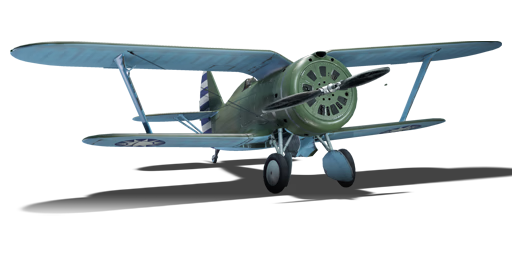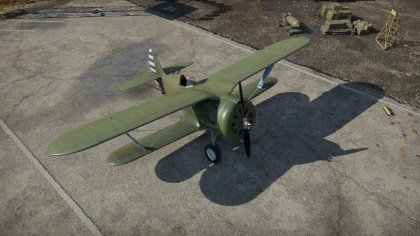I-153 M-62 (China)
Contents
Description
The ␗I-153 M-62 is a rank Chinese fighter
with a battle rating of (AB), (RB), and (SB). It was introduced in Update 1.91 "Night Vision".
General info
Flight performance
The I-153 M-62 Chaika (China) has a really good turn radius thanks to retractable landing gear, that increases aerodynamics. This plane's battle rating makes it a match against early BF 109's and other single wing fighters. This allows the I-52 M-62 to out-turn planes at its battle rating. The plane does not come without its downsides, for example other planes at this battle rating can go faster than this plane, which you might have a difficult time keeping up with other fighters.
| Characteristics | |||||||
|---|---|---|---|---|---|---|---|
| Stock | |||||||
| Max Speed (km/h at 4,850 m) |
Max altitude (meters) |
Turn time (seconds) |
Rate of climb (meters/second) |
Take-off run (meters) | |||
| AB | RB | AB | RB | AB | RB | ||
| 425 | 410 | 13.8 | 14.4 | 11.4 | 11.4 | 274 | |
| Upgraded | |||||||
| Max Speed (km/h at 4,850 m) |
Max altitude (meters) |
Turn time (seconds) |
Rate of climb (meters/second) |
Take-off run (meters) | |||
| AB | RB | AB | RB | AB | RB | ||
| 466 | 444 | 13.0 | 13.3 | 20.1 | 15.2 | 274 | |
Details
| Features | ||||
|---|---|---|---|---|
| Combat flaps | Take-off flaps | Landing flaps | Air brakes | Arrestor gear |
| X | X | X | X | X |
| Limits | ||||
|---|---|---|---|---|
| Wing-break speed (km/h) |
Gear limit (km/h) |
Combat flaps (km/h) |
Max Static G | |
| + | - | |||
| N/A | ~12 | ~6 | ||
| Optimal velocities | |||
|---|---|---|---|
| Ailerons (km/h) |
Rudder (km/h) |
Elevators (km/h) |
Radiator (km/h) |
| < 180 | < 240 | < 380 | > 250 |
| Compressor (RB/SB) | ||
|---|---|---|
| Setting 1 | ||
| Optimal altitude | 100% Engine power | WEP Engine power |
| 1,530 m | 840 hp | 1,024 hp |
| Setting 2 | ||
| Optimal altitude | 100% Engine power | WEP Engine power |
| 4,200 m | 800 hp | 975 hp |
Survivability and armour
Examine the survivability of the aircraft. Note how vulnerable the structure is and how secure the pilot is, whether the fuel tanks are armoured, etc. Describe the armour, if there is any, and also mention the vulnerability of other critical aircraft systems.
Armaments
Offensive armament
The I-153 M-62 (China) is armed with:
- 4 x 7.62 mm ShKAS machine guns, nose-mounted (700 + 750 + 520 + 500 = 2,470 total)
Suspended armament
The I-153 M-62 (China) can be outfitted with the following ordnance:
- Without load
- 4 x 50 kg FAB-50 bombs (200 kg total)
- 8 x RS-82 rockets
- 8 x RBS-82 rockets
Usage in battles
Describe the tactics of playing in the aircraft, the features of using aircraft in a team and advice on tactics. Refrain from creating a "guide" - do not impose a single point of view, but instead, give the reader food for thought. Examine the most dangerous enemies and give recommendations on fighting them. If necessary, note the specifics of the game in different modes (AB, RB, SB).
Simulator:
The I-153 can be used in turnfighting, bomber intercepting and ground pounding. Like in AB and RB, it is excellent in turning tightly and continuously, and it has lovely low-speed handling and low stall speeds (unlike its successor I-16), making it a great starter plane for sim. However it does have its drawbacks: the rather big nose blocks the visibility a lot, offering very poor over-the-nose visibility which is a disadvantage in a turn fight, because when leading a shot the enemy will always get obstructed by the engine, making the player guess the shot. Also its upper wings will get in the way when you look aside.
Note: it is recommended to set the convergence within 300m, with vertical convergence on, because the majority of turnfights happen at that range or closer.
Before engaging a fight, it is better to have an altitude advantage first. When approaching the fight try to figure out which is your teammate and which is the enemy, to avoid going for a second pass, as the energy retention of the I-153 is rather slow. Also pick your target carefully. For easier aiming, you want to go for those unmaneuverble twin engine aircraft like Ju 88 or Ki-45, or bombers if there are any. Given the bad forward visibility of the I-153, these are the best options as they are quite slow and sluggish, and are a bigger target to hit. However getting hits on them doesn't mean good damage, so you must be patient. When dealing with fighters, it is way harder to aim. The elevator control of the I-153 is extremely sensitive, giving it good maneuverbility, but at the same time, bad handling. The I-153 will respond in a very fast turn upon moving your stick / mouse by a little bit, which makes tracking nimble planes quite hard. But once you get used to it, try to lure every enemy into a turnfight, as that is where the I-153 shines. Quite a bit of bullets are required to effectively damage the enemy so you must be patient. If you find an enemy at your 6, utilise your great roll rate to do defensive maneuvers like scissors to make them overshoot. Or you can simply do tight turns, most monoplanes won't be able to cut inside your turn and they might disengage.
If you are not very experienced in sim, you can also go for even bigger targets (bombers) for easier aiming. However you want to be more careful when hunting bombers, since with the Sim control (whether it be mouse joystick or a real stick) the plane will manoeuvre much more gently, making itself a great target for the bomber's gunners. DO NOT follow behind a bomber's 6 unless you are sure that its tail gunners are unconscious. Chasing behind a bomber makes yourself stationary for the tail gunners, and you will be showered with bullets. Your big radial engine will usually get damaged. Instead, before attacking, get an altitude advantage over the bomber by flying around 2 km above it. The bomber should only fill up about 1/6 of your gunsight. The best position for an attack is at the bomber's high 6 so you can adjust the lead much easier. Dive at the bomber, but not directly at it, try to predict where you two will crash by imagining yourself as a missile, that's where you should aim at (deflection shooting). To maximise the damage it is better to aim for their wings and engines, as the fuselage usually soaks up quite some bullets. Only fire when the bomber passes in front of your guns. This short window might seem inadequate to do anything, but with a accurate burst on the engine the 4 MG can at least damage it. With an engine damaged most bombers cannot go far.
Ground pounding ability is average as there is only bombs and rockets. The 8 rockets, with accurate aiming, can destroy 4 targets, whether them be tanks or pillboxes. The small 50kg bombs can be used on light pillboxes. Once the suspended armaments are gone, the 4 MG are good for killing soft targets like trucks, artillery and AA cars.
Manual Engine Control
| MEC elements | ||||||
|---|---|---|---|---|---|---|
| Mixer | Pitch | Radiator | Supercharger | Turbocharger | ||
| Oil | Water | Type | ||||
| Controllable | Controllable Not auto controlled |
Controllable Not auto controlled |
Controllable Not auto controlled |
Separate | Controllable 2 gears |
Not controllable |
Modules
| Tier | Flight performance | Survivability | Weaponry | ||
|---|---|---|---|---|---|
| I | Fuselage repair | Radiator | Offensive 7 mm | DZ-40 | |
| II | Compressor | Airframe | RO-82 | ||
| III | Wings repair | Engine | New 7 mm MGs | ||
| IV | Engine injection | Cover | |||
Pros and cons
Summarise and briefly evaluate the vehicle in terms of its characteristics and combat effectiveness. Mark its pros and cons in the bulleted list. Try not to use more than 6 points for each of the characteristics. Avoid using categorical definitions such as "bad", "good" and the like - use substitutions with softer forms such as "inadequate" and "effective".
Pros:
Cons:
History
Describe the history of the creation and combat usage of the aircraft in more detail than in the introduction. If the historical reference turns out to be too long, take it to a separate article, taking a link to the article about the vehicle and adding a block "/History" (example: https://wiki.warthunder.com/(Vehicle-name)/History) and add a link to it here using the main template. Be sure to reference text and sources by using <ref></ref>, as well as adding them at the end of the article with <references />. This section may also include the vehicle's dev blog entry (if applicable) and the in-game encyclopedia description (under === In-game description ===, also if applicable).
Media
Excellent additions to the article would be video guides, screenshots from the game, and photos.
See also
Links to the articles on the War Thunder Wiki that you think will be useful for the reader, for example:
- reference to the series of the aircraft;
- links to approximate analogues of other nations and research trees.
External links
Paste links to sources and external resources, such as:
- topic on the official game forum;
- encyclopedia page on the aircraft;
- other literature.
| Polikarpov Design Bureau (Опытное конструкторское бюро Поликарпова) | |
|---|---|
| I-15 | I-15 WR · I-15 M-22 · I-15 M-25 · I-15bis · Krasnolutsky's I-15bis |
| I-153 | I-153 M-62 · Zhukovsky's I-153-M62 · I-153P |
| I-16 | I-16 type 5 · I-16 type 10 · I-16 type 18 · I-16 type 24 · I-16 type 27 · I-16 type 28 |
| I-180 | I-180S · I-185 (M-71) · I-185 (M-82) |
| ITP | ITP (M-1) |
| Twin-engine fighters | TIS MA |
| Bombers | Po-2 · Po-2M |
| Export | ␗I-15bis · ␗I-153 M-62 · ␗I-16 type 5 · ␗I-16 type 10 · ␗I-16 type 17 · ␗I-16 Chung 28 |
| China fighters | |
|---|---|
| British | ␗Gladiator Mk I |
| French | D.510C |
| Japanese | ␗A6M2 · ␗Ki-27 otsu · ␗Ki-43-III ko · ␗Ki-44-II hei · ␗Ki-61-I otsu · ␗Ki-84 ko |
| American | CW-21 · Hawk III · P-66 · ␗P-40E-1 · H-81A-2 · ␗P-43A-1 |
| ␗P-47D-23-RA · ␗P-47D-30 · ␗F-47N-25-RE · ␗P-51C-11-NT · ␗P-51D-20 · ␗P-51K | |
| Soviet | ␗I-15bis · ␗I-153 M-62 · ␗I-16 Chung 28 · ␗I-16 type 5 · ␗I-16 type 10 · ␗I-16 type 17 · ␗La-11 · ␗La-9 |





